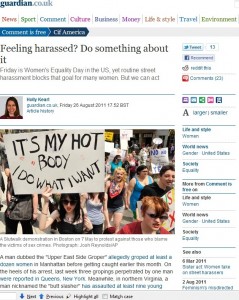 The Guardian just published an op-ed I wrote for today’s Women’s Equality Day! Check it out and consider leaving a comment.
The Guardian just published an op-ed I wrote for today’s Women’s Equality Day! Check it out and consider leaving a comment.
(By the way, a dozen op-eds and articles I’ve written have been published since I did The Op-Ed Project training last year. I highly recommend it!!)
A man dubbed the “Upper East Side Groper” allegedly groped at least a dozen women in Manhattan before getting caught earlier this month. On the heels of his arrest, last week three gropings perpetrated by one man were reported in Queens, New York. Meanwhile, in northern Virginia, a man nicknamed the “butt slasher” has assaulted at least nine young women in shopping malls across the past few months. He has not been caught.
Aren’t these just unfortunate, isolated, random incidents, you may ask. No.
The news stories simply bring to light experiences that happen to too many women. Recently, when a woman in Astoria, New York, blogged about a man groping her, 45 women emailed her with similar stories. More than half of 800 female survey respondents of a 2008 study said they had been groped or sexually touched in public. The majority of the respondents were only in their teens and twenties. When I was 18 years old, a man groped me on a street near my college campus, making me part of that percentage.
Today is Women’s Equality Day in the United States. But equality is more of a wish than our reality when so many inequalities exist – including women’s unequal access to public places because of gender-based street harassment, including gropings and slashings.
Street harassment comprises actions and comments between strangers in public that are disrespectful, creeping, threatening and unwanted. It ranges from whistling and sexist or sexual comments to flashing, stalking, groping and assault. It primarily impacts women, including more than 80% of women worldwide, and it directly limits their access to public spaces.
The milder forms of harassment like whistling and comments are often dismissed as a compliment – something women “ask for” – or a harmless annoyance. The reality is, they cause harm; and their accumulation can make women feel wary in public and even “choose” not to go places unaccompanied.
For Psychology Today, Dr Kathryn Stamoulis recently wrote about how a teenage girl she counsels confided that she did not want to run errands for her parents or go to school unaccompanied because adult men sexually harass her. Many harassed individuals are like her: teenage girls whose perception of self, of men, and of their place in the world, is negatively impacted by the sexual harassment they face on the streets.
Women who face lots of mild forms of harassment, or just one serious form like groping or stalking, may feel obliged to change commuting routes, only go places accompanied, or even move neighbourhoods, change jobs or quit hobbies to avoid further victimisation. Street harassment genuinely impedes women’s equality by limiting women’s access to public places; it denies them the liberty they should have of being able to walk freely in public without harassment.
Thankfully, more and more people are recognising that street harassment is a barrier to equality and a denial of liberties – and they’re taking action. Ever since New York City councilwoman Julissa Ferreras found out that teenage girls in her district face street harassment on their way to and from school, she has made the issue a priority. Last week, she took to the streets to raise awareness about the rampant groping in Queens, and last fall, she broke new ground by organising the first-ever city council hearing on street harassment.
A college student at Stanford University with whom I’ve corresponded is currently organising a coalition of people and groups in the California Bay Area to advocate for anti-street harassment measures. This summer, she worked with transit authorities to add sexual harassment information to their brochures and website and possibly to start an awareness ad campaign.
In Washington, DC this past spring, 50 volunteers, just ordinary residents of the city, participated in a community safety audit, organised by Holla Back DC! and me. On designated dates, they fanned out across the city to analyse what the streets looked like during the day, and at night, and then made recommendations for how to make the city safer. During the last week of September, we will be encouraging interested persons to keep a “street harassment log” for a week using a log we provide. Because street harassment is under-documented and researched, the goals of these projects are to start documenting harassment better – and to add to the growing number of stories being collected online – so we can then work on solutions.
What can you do to ensure women have equal access to public spaces? Your role can be as simple as sharing a story, talking about boundaries and consent, or helping out when you see harassment occurring. Every action helps and every action can bring us closer to Women’s Equality Day being a reality, not just a wish.
